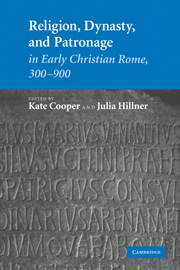Book contents
- Frontmatter
- Contents
- Acknowledgements
- List of contributors
- Abbreviations
- Introduction
- PART I ICONS OF AUTHORITY: POPE AND EMPEROR
- PART II LAY, CLERICAL, AND ASCETIC CONTEXTS FOR THE ROMAN GESTA MARTYRUM
- PART III RELIGION, DYNASTY, AND PATRONAGE
- 6 Poverty, obligation, and inheritance: Roman heiresses and the varieties of senatorial Christianity in fifth-century Rome
- 7 Demetrias ancilla dei: Anicia Demetrias and the problem of the missing patron
- 8 Families, patronage, and the titular churches of Rome, c. 300–c. 600
- 9 To be the neighbour of St Stephen: patronage, martyr cult, and Roman monasteries, c. 600–c. 900
- Bibliography
- Index
7 - Demetrias ancilla dei: Anicia Demetrias and the problem of the missing patron
Published online by Cambridge University Press: 02 October 2009
- Frontmatter
- Contents
- Acknowledgements
- List of contributors
- Abbreviations
- Introduction
- PART I ICONS OF AUTHORITY: POPE AND EMPEROR
- PART II LAY, CLERICAL, AND ASCETIC CONTEXTS FOR THE ROMAN GESTA MARTYRUM
- PART III RELIGION, DYNASTY, AND PATRONAGE
- 6 Poverty, obligation, and inheritance: Roman heiresses and the varieties of senatorial Christianity in fifth-century Rome
- 7 Demetrias ancilla dei: Anicia Demetrias and the problem of the missing patron
- 8 Families, patronage, and the titular churches of Rome, c. 300–c. 600
- 9 To be the neighbour of St Stephen: patronage, martyr cult, and Roman monasteries, c. 600–c. 900
- Bibliography
- Index
Summary
How, then, could we so far conceal our true feelings as not to warn you, in whom we feel so deep an interest, to beware of such doctrines, after we had read a certain book addressed to the holy Demetrias? Whether this book has reached you, and who is its author, we are desirous to hear in your answer to this.
Augustine, Epistula 188.4Writing in 413 to Anicia Juliana, the mother of the recently dedicated virgin Demetrias, Augustine of Hippo expressed his concern that her daughter had been preyed upon by the author of a dangerous letter containing novel doctrines on divine grace. The letter to which Augustine referred was indeed dangerous: it was none other than the now famous Epistula ad Demetriam of Pelagius, the manifesto in which the holy man made known to influential members of the Roman church the ideas on the nature of the soul for which he would eventually be condemned as a heretic. Augustine's implication is that despite or perhaps because of her exalted social standing, Demetrias was in danger of becoming a pawn in a high-stakes game of ecclesiastical authority. Augustine knew – as Pelagius would have known – that by addressing the letter to a figure so exalted as Demetrias, its contents would acquire an aura of respectability for a wider readership that would be difficult, if not impossible, to dispel. The letter is one of the few undisputed works of Pelagius to survive.
- Type
- Chapter
- Information
- Publisher: Cambridge University PressPrint publication year: 2007
- 8
- Cited by



